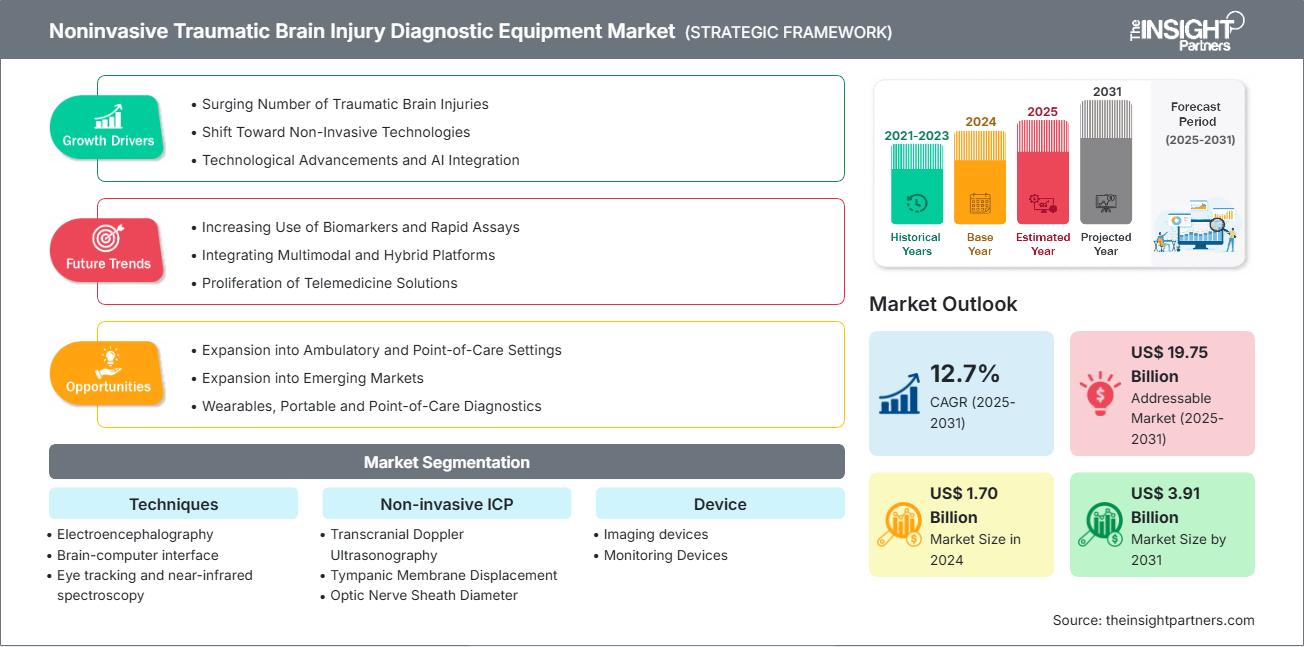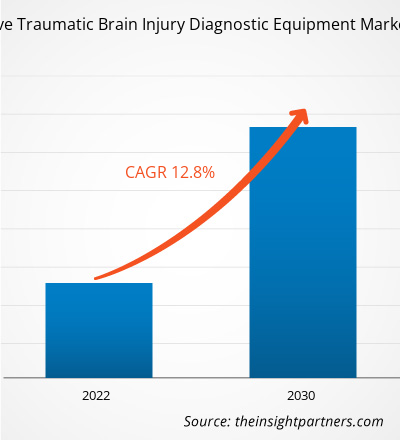非侵入性创伤性脑损伤诊断设备市场预计将从 2024 年的 17 亿美元增长到 2031 年的 39.1 亿美元,2025 年至 2031 年的复合年增长率为 12.7%。
非侵入性创伤性脑损伤诊断设备市场分析
创伤性脑损伤数量的激增、向非侵入性技术的转变、技术进步以及人工智能的整合推动了市场的增长。向门诊、即时医疗以及新兴市场的扩张,将为未来几年非侵入性创伤性脑损伤诊断设备市场创造充足的机遇。
非侵入性创伤性脑损伤诊断设备市场概况
预计北美将主导市场,在预测期内占据最大份额。由于创伤性脑损伤病例激增,预计亚太地区在预测期内将实现显著的复合年增长率。此外,先进的医疗基础设施、创伤性脑损伤的高发病率以及对研发的投入,也刺激了对非侵入性创伤性脑损伤诊断设备的需求。
您将获得任何报告的免费定制,包括本报告的部分内容、国家级分析、Excel 数据包,以及为初创企业和大学提供优惠和折扣
非侵入性创伤性脑损伤诊断设备市场:战略洞察

-
获取此报告的顶级关键市场趋势。此免费样品将包括数据分析,从市场趋势到估计和预测。
非侵入性创伤性脑损伤诊断设备市场驱动因素和机遇
市场驱动因素:
- 创伤性脑损伤数量激增:不断飙升的疾病负担引发了巨大的临床、社会和经济需求。据估计,轻度创伤性脑损伤 (TBI) 约占全球所有 TBI 的 50%。
- 向非侵入性技术转变:便携式成像技术,包括 EEG、NIRS、MRI 和 AI 驱动的超声波,正在改变诊断方式,为医疗保健市场的创新和速度树立新的标杆。
- 技术进步和人工智能集成:人们对分析数据、减少人为错误、缩短诊断时间并使诊断更接近实时的工具的需求日益增长。
市场机会:
- 扩展到门诊和护理点设置:TBI 诊断正在扩展到门诊和护理点 (POC) 设置,从而能够在传统医院急诊科之外进行诊断和分诊。
- 向新兴市场扩张:新兴市场的增长受到道路交通事故、运动相关伤害和老年人口不断增长的推动,所有这些都导致 TBI 患病率上升。
- 可穿戴设备、便携式设备和即时诊断:传统的 TBI 诊断依赖于昂贵、笨重且固定的成像设备(如 CT 和 MRI 扫描仪),在紧急情况、农村和资源匮乏的环境中无法进行。
非侵入性创伤性脑损伤诊断设备市场报告细分分析
为了更清晰地了解非侵入性创伤性脑损伤诊断设备市场运作方式、增长潜力和最新趋势,我们将市场细分为多个细分领域。以下是行业报告中使用的标准细分方法:
按技术分类:
- 脑电图 (EEG):脑电图 (EEG) 可以提供有关大脑电活动的实时功能信息。
- 脑机接口 (BCI):BCI 通过在大脑和外部设备之间提供直接的通信通路而带来革命性的变化。
- 眼动追踪和近红外光谱 (NIRS):除了监测大脑功能的既定方法外,这些方法还提供有关神经系统和脑血流的进一步数据。
- 磁共振成像 (MRI):MRI 仍然是一个基本组成部分,可提供大脑结构和完整性的高质量、多序列图像。
- 脑磁图 (MEG):MEG 测量大脑神经元电流产生的微小磁场。
- 经颅磁刺激 (TMS):TMS 提供详细的、非侵入性的现场脑功能检查,有助于诊断创伤性脑损伤 (TBI),而传统的成像技术可能对此无效。
- 脑氧代谢率(CMRO2):CMRO2直接指示大脑的代谢健康和氧利用情况,为功能性脑损伤提供更准确的评估。
- 颅内压:需要进行 ICP 监测以检测和控制颅内压升高。
- 其他:其他部分包括测量视神经鞘直径(ONSD)、经颅多普勒超声和红外光学设备。
通过无创ICP:
- 经颅多普勒超声检查 (TCD):TCD 可以在患者床边连续测量脑血流量,这是使用便携式、低成本超声技术进行无创诊断和创伤性脑损伤治疗的重要辅助手段。
- 鼓膜位移 (TMD):鼓膜位移 (TMD) 是一种新兴技术,提供了一种独特的方法来估计 ICP
- 视神经鞘直径 (ONSD):视神经鞘直径 (ONSD) 测量因其作为颅内压 (ICP) 替代标志物的有效性而闻名。
- 磁共振成像 (MRI) 和计算机断层扫描 (CT):MRI 和 CT 扫描仍然是检测脑损伤的前沿非侵入性方法。它们在提供详细的解剖成像方面非常有帮助,有助于准确诊断 TBI。
- 眼底镜检查和视乳头水肿:最近的创新重点是提高眼底镜检查对 TBI 诊断的准确性和可用性。
按设备:
- 成像设备:非侵入性创伤性脑损伤 (TBI) 诊断极大地受益于 MRI、CT 和 TCD 等成像设备的使用,这些设备有助于准确评估、监测和治疗计划。
- 监测设备:监测设备能够对关键大脑功能进行连续或可重复的评估,而没有与侵入性方法相关的风险。
按最终用户:
- 医院和诊所
- 诊断中心
- 其他的
按地理位置:
- 北美
- 欧洲
- 亚太地区
- 拉美
- 中东和非洲
非侵入性创伤性脑损伤诊断设备市场区域洞察
Insight Partners 的分析师已详尽阐述了预测期内影响非侵入性创伤性脑损伤诊断设备市场的区域趋势和因素。本节还讨论了非侵入性创伤性脑损伤诊断设备市场在北美、欧洲、亚太、中东和非洲以及南美和中美的细分市场和地域分布。
无创性创伤性脑损伤诊断设备市场报告范围
| 报告属性 | 细节 |
|---|---|
| 2024年的市场规模 | 17亿美元 |
| 2031年的市场规模 | 39.1亿美元 |
| 全球复合年增长率(2025-2031) | 12.7% |
| 史料 | 2021-2023 |
| 预测期 | 2025-2031 |
| 涵盖的领域 |
按技术
|
| 覆盖地区和国家 |
北美
|
| 市场领导者和主要公司简介 |
|
非侵入性创伤性脑损伤诊断设备市场参与者密度:了解其对业务动态的影响
非侵入性创伤性脑损伤诊断设备市场正在快速增长,这得益于终端用户需求的不断增长,而这些需求的驱动因素包括消费者偏好的不断变化、技术进步以及对产品优势的认知度不断提高。随着需求的增长,企业正在扩展产品线,不断创新以满足消费者需求,并抓住新兴趋势,从而进一步推动市场增长。

- 获取非侵入性创伤性脑损伤诊断设备市场顶级关键参与者概览
非侵入性脑外伤诊断设备市场份额地域分析
北美占据无创性创伤性脑损伤诊断设备市场的主导地位,市场份额最大。创伤性脑损伤数量的激增以及完善的医疗基础设施等因素推动了市场的增长。预计亚太地区在未来几年将以最快的速度增长。南美、中美、中东和非洲等新兴市场为无创性创伤性脑损伤诊断设备供应商提供了尚未开发的扩张机会。
非侵入性创伤性脑损伤诊断设备市场在各个地区的增长情况有所不同。以下是各地区市场份额和趋势的总结:
1. 北美
- 市场份额:占据全球市场的很大份额
- 关键驱动因素:创新的非侵入性诊断方法,例如近红外光谱 (NIRS) 和先进的成像技术,通过提供比传统方法更安全、更具成本效益的替代方案,彻底改变了 TBI 评估。
- 趋势:制造业进步和可持续实践
2.欧洲
- 市场份额:由于脑部疾病患病率不断上升,市场份额大幅增加
- 关键驱动因素:该地区致力于改善患者治疗效果,这体现在开发和采用先进的诊断工具,优先考虑安全性、效率和可及性
- 趋势:监管对市场结构的影响
3. 亚太地区
- 市场份额:增长最快的地区,市场份额逐年上升
- 关键驱动因素:该地区涵盖拥有不同医疗保健基础设施的不同国家,面临着 TBI 带来的巨大负担。
- 趋势:配方和交付方面的创新
4. 南美洲和中美洲
- 市场份额:市场稳步增长
- 关键驱动因素:国际组织和地方政府之间的合作促进了非侵入性诊断工具融入医疗保健系统。
- 趋势:诊断试剂盒制造的技术发展
5.中东和非洲
- 市场份额:虽然较小,但增长迅速
- 关键驱动因素:各国政府正在实施神经创伤护理方面的专门劳动力培训计划,同时投资于院前基础设施的建设,包括配备 TBI 移动诊断技术的紧急运输系统。
- 趋势:诊断产品的增长
非侵入性创伤性脑损伤诊断设备市场参与者密度:了解其对业务动态的影响
市场密度高,竞争激烈
由于通用电气医疗科技公司 (GE HealthCare Technologies Inc.)、飞利浦 (Philips) 和医科达 (Elekta AB) 等老牌企业的存在,竞争异常激烈。此外,纳特斯医疗 (Natus Medical Inc.) 和 BrainScope 公司等区域性和利基供应商也加剧了跨地区的竞争格局。
这种激烈的竞争促使公司通过提供以下产品脱颖而出:
- 高级产品
- 定制和可持续解决方案等增值服务
- 有竞争力的定价模式
- 遵守监管准则
机遇与战略举措
- 企业正在加大研发投入,推动诊断技术的创新。这些投资提高了设备的灵敏度和特异性,从而解决了不同地区特定的脑健康问题。
- 制造商可能会专注于本地生产以削减成本并加强供应链,尤其是在印度等大批量市场。
研究过程中分析的其他公司:
- 佳能医疗系统株式会社
- 高级脑监测公司
- Compumedics有限公司
- Sense Diagnostics公司
- NeuroWave 系统公司
- Oculogica公司
- 维塔梅德公司
- InfraScan公司
- 神经分析公司
- CAS医疗系统公司
非侵入性创伤性脑损伤诊断设备市场新闻和最新发展
- BrainScope宣布推出其下一代深度学习平台。该公司已开发并商业化了首个获得FDA批准的神经病学领域人工智能/机器学习医疗设备。
- GE医疗集团旗下创新型SIGNA MAGNUS获得FDA 510(k)认证,这是一款3.0T高性能头部MRI扫描仪。该系统为临床成像和神经科学领域带来了全新功能。
非侵入性创伤性脑损伤诊断设备市场报告覆盖范围和交付成果
《非侵入性创伤性脑损伤诊断设备市场规模和预测(2021-2031)》报告对以下领域进行了详细的市场分析:
- 非侵入性创伤性脑损伤诊断设备市场规模及全球、区域和国家层面所有关键细分市场的预测
- 非侵入性创伤性脑损伤诊断设备市场趋势,以及驱动因素、限制因素和关键机遇等市场动态
- 详细的 PEST 和 SWOT 分析
- 非侵入性创伤性脑损伤诊断设备市场分析,涵盖主要市场趋势、全球和区域框架、主要参与者、法规和最新市场发展
- 行业格局和竞争分析,涵盖市场集中度、热图分析、知名参与者以及非侵入性创伤性脑损伤诊断设备市场的最新发展
- 详细的公司简介
- 历史分析(2 年)、基准年、预测(7 年)及复合年增长率
- PEST和SWOT分析
- 市场规模、价值/数量 - 全球、区域、国家
- 行业和竞争格局
- Excel 数据集
近期报告
客户评价
购买理由
- 明智的决策
- 了解市场动态
- 竞争分析
- 客户洞察
- 市场预测
- 风险规避
- 战略规划
- 投资论证
- 识别新兴市场
- 优化营销策略
- 提升运营效率
- 顺应监管趋势






















 获取免费样品 - 非侵入性创伤性脑损伤诊断设备市场
获取免费样品 - 非侵入性创伤性脑损伤诊断设备市场